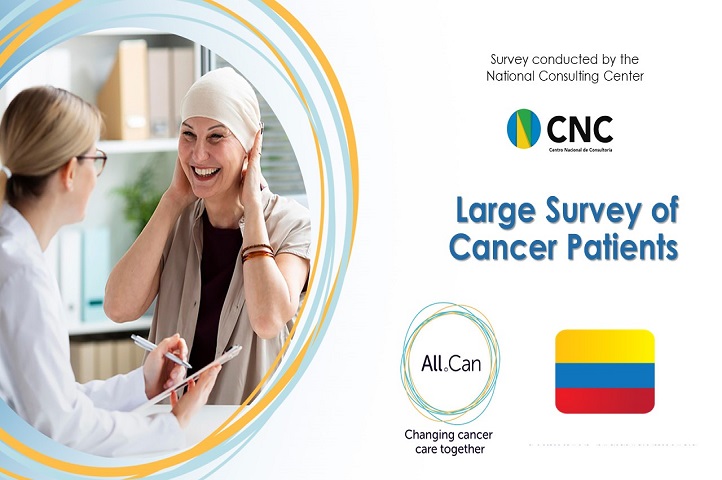
- The survey, carried out by All.Can Colombia, had a quantitative phase in which 800 patients participated and a qualitative phase where 40 in-depth interviews were conducted with doctors, caregivers, and health professionals from September to November 2021 around the country.
- More than a third of surveyed people say they have had to resort to legal mechanisms to access treatment and only 36% of those surveyed obtained their diagnosis thanks to early detection programs.
A new survey carried out by All.Can Colombia reflects that, to access comprehensive care in Colombia, patients must overcome endless barriers. Around 275,000 people in the country suffer from this situation.
In order to identify the main systematic failures about cancer, 800 patients living with any type of cancer were surveyed, with the logistical support of the National Consulting Center and the scientific direction of the Colombian Association of Hematology and Oncology. The results of this largest study statistically conducted in the country on cancer patients show the urgency of working on four main aspects: ensuring timely diagnosis, facilitating access to treatment, making integrated multidisciplinary care a reality for all patients, and guaranteeing health service in times of COVID-19.
“According to the patients, there is a high perception of inefficiency in all stages of medical care. More than half of the respondents have experienced unjustified denials during the diagnosis and treatment processes. This is added to the delays due to administrative procedures to obtain the medicines, having to resort to mechanisms such as guardianship. In Colombia, where health is a right, no one should have to go to these legal instances,” explains Dr. Virginia Abello, president of the Colombian Association of Hematology and Oncology.
Detection programs:
The results of the study show that only 36% of the surveyed people obtained their diagnosis thanks to an early detection program of their EPS or Prepaid Medicine. In the case of breast cancer, only 45% of those surveyed were diagnosed by these means. These figures fall short of the goals established by the National Plan for Cancer Control in Colombia, that established to expand coverage and accessibility to tests such as mammography and cytology.
The data does not only show a decrease in access to the mechanisms for adequate diagnosis, but also the delay in obtaining the analysis of the results. It was shown that, from the appearance of the first symptoms, 41% of the people surveyed reported a delay of more than one month between the result of the studies and the definitive confirmation of the cancer diagnosis by the specialist.
Barriers due to COVID-19:
Dr. Virginia Abello points out: “One of the biggest shortcomings we have dealing with cancer is that there is no a comprehensive management. By law, all cancer patients should receive priority and quality care, including psychological support; however, the study figures and the patients themselves affirm that there is no evident access to psychological support or efficient pain control”.
The COVID-19 situation has affected the medical processes of more than a half of the people surveyed, especially concerning access to medical appointments, authorizations, tests, and medications. However, from the total, the number of people who continued to carry out their procedures and processes normally is greater. This means that, once again, the delays have been due to issues external to patient management.
Based on these findings, All.Can Colombia hopes to continue contributing to improving the efficiency of cancer treatment in the country. In particular, the coalition seeks to ensure that the data collected serves as an input for the formulation of public policies that favor patients, regarding the formulation of the Ten-Year Public Health Plan 2022-2031.
Check The Results: All.Can Colombia – Large Survey of Cancer Patients